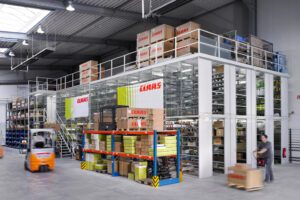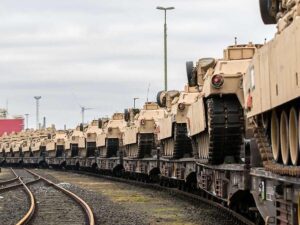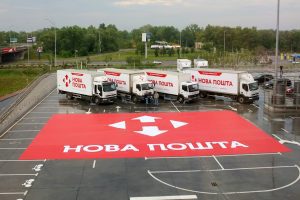
American automaker Ford Motor has delayed deliveries of some vehicles due to the lack of blue oval badges with the company’s logo.
According to The Wall Street Journal, citing sources, the company is faced with a shortage of nameplates and plates indicating the model, which are attached to the car body and are important identifiers for the automaker’s products.
A spokesman for the company confirmed to the publication that deliveries of a number of vehicles were delayed due to missing badges. This is yet another example of how hard supply chain problems have hit automakers, the WSJ notes.
Ford has been considering a number of workarounds, such as 3D-printed nameplates, until supplies are restored, the sources said. But such substitutes do not inspire confidence, and may not meet the high quality bar of the automaker, the management decided.
Earlier this week, the company warned investors that high inflation and a lack of spare parts were leading to lower supplies. As a result, from 40,000 to 45,000 vehicles will remain in the company’s warehouses by the end of the third quarter due to the lack of a number of parts.
However, Ford reiterated its guidance for 2022, which suggests that adjusted earnings before taxes and interest payments could be $11.5-12.5 billion. In the third quarter, this figure is expected to be in the region of $1.4-1.7 billion.
Ford shares fell 5.4% in trading on Friday. Since the beginning of this year, the automaker’s market value has collapsed by almost 42%, while the Standard & Poor’s 500 stock index has fallen by about 23%.

The German concern Bayer AG, which specializes in biomedical solutions for healthcare and agriculture, has decided to continue supplying basic agricultural solutions to Russian farmers so that they can contribute to meeting global demand.
At the same time, Bayer hopes “that the Russian authorities will continue to provide free supplies of agricultural products” and “will not use food as a means of pressure on the world,” the company’s statement emphasizes.
At the same time, Bayer intends to invest heavily in Ukraine over the next decade. In particular, the company is investing more than EUR30 million in a seed plant in the Zhytomyr region to meet the demand for corn seeds in the country and abroad.
Bayer is fully committed to fighting what could become an unprecedented food crisis and shares the UN’s view that access to Ukrainian and Russian food is essential to reduce pressure on the global food system, the release notes.
Earlier, the company stopped deliveries to the Russian Federation and Belarus of those products that are not vital, and also suspended advertising and promotional activities, investments in these countries.

A Ukrainian transport company reacted positively to the proposal of Slovnaft and MOL to pay transit fees for transporting oil through the southern branch of the Druzhba oil pipeline, the Slovak company said.
“Slovnaft has already made a payment to the company’s account. Based on this, Slovnaft expects the resumption of oil supplies in the coming days. The Russian side also agreed with this decision,” the company stressed.
According to Bloomberg, the Hungarian MOL also transferred the transit payment and expects to resume deliveries in the coming days.
Earlier, Transneft reported that on August 4, Ukrtransnafta stopped the transit of Russian oil through Ukraine due to a failure to pay the transit fee. It was noted that the funds sent on July 22 for transit in August were returned to the account of Transneft on July 28 in connection with the entry into force of EU Regulation 2022/1269. Through the southern branch of the Druzhba oil pipeline passing through the territory of Ukraine, oil supplies are carried out in the direction of the refineries of Hungary, Slovakia and the Czech Republic on the basis of a long-term agreement between PJSC Transneft and JSC Ukrtransnafta for the provision of oil transportation services on the terms of 100% prepayment.
The Hungarian MOL and the Slovak Slovnaft (also part of the MOL group) initiated discussions with the Ukrainian and Russian sides on the possibility of paying a transit fee to MOL or Slovnaft, which would allow oil supplies to be restored.
“The interruption of supplies occurred after technical problems at the bank level due to the payment of transit fees from the Russian side. However, production at the Bratislava refinery is running smoothly, and deliveries to the market are smooth. During this period, the Bratislava refinery is in close cooperation with the national oil transporter Transpetrol, as well as in cooperation with the Slovak Ministry of Economy, uses all the reserves available in the system for processing,” Slovnaft said.
So far, there have been no reports of a solution to the problem of transit to the Czech Republic.
Last year, 12 million tons of Russian oil was transported through Druzhba through Ukraine, including 3.4 million tons to the Czech Republic, 5.2 million tons to Slovakia, and 3.4 million tons to Hungary.

In order to prevent the disruption of the sowing campaign in Ukraine due to breakdowns of agricultural equipment, the German manufacturer of agricultural machinery Claas has established an automobile channel for the constant supply of spare parts to the country, the company said on its Facebook page on Tuesday.
The company made such a decision on the logistics of spare parts, since air transportation of components to Ukraine is now impossible due to the closed sky due to the war unleashed by Russia.
“Claas, despite the absence of air traffic in Ukraine during this period, has established systemic express deliveries of the necessary spare parts for agricultural machinery. Now a shuttle is running from the central warehouse of Claas spare parts in Hamm (Germany) to Ukraine, bringing urgent orders,” he wrote. manufacturer.
The machine-building company emphasized that due to the military invasion of the aggressor country of the Russian Federation in Ukraine, all logistics processes were disrupted, which led to the impossibility of meeting the agreed terms for the supply of spare parts, but the company is doing everything possible to support its customers in Ukraine.
As reported, in mid-March, Claas said it was shocked by the escalation of Russian military aggression in Ukraine, as a result of which it stopped production in the Russian Federation and evacuated all its Ukrainian employees to a safe place.
Claas manufactures self-propelled grain harvesters, self-propelled forage harvesters, tractors, trailers for harvesting green fodder, telescopic loaders, balers, self-loading trailers. The main production facilities are located in Germany and France.
According to its Russian branch, Claas in Russia owns a harvester plant in Krasnodar, which has been operating since 2003.
Its branch LLC “Claas Ukraine” (Kyiv) has been operating in Ukraine since 1992. During this time, he imported over 8 thousand units of self-propelled equipment. In Ukraine, the company operates through a network of representative offices located in all regions of the country.

The German parliament has agreed on the supply of heavy military equipment to Ukraine, said Markus Faber, a member of the Bundestag from the Free Democratic Party (FDP) and a member of the parliamentary group on defense policy.
“Dear friends, Germany will now quickly supply heavy equipment to Ukraine. I am glad that we from the FDP parliamentary group in the Bundestag were able to convince our coalition partners of this,” Faber tweeted on Wednesday.
According to him, in terms of logistics and time, this task will not be easy, “but we are finally starting.”
“Ukrainians need our material assistance to protect their republic from a neighboring dictatorship. Like many other democracies around the world, we give them this,” Faber added.

Nova Poshta Global, a part of the Nova Poshta Group, has started delivering parcels from China’s AliExpress trading platform to Ukraine by trucks. The press service of the company said on Tuesday that last week a truck with parcels from AliExpress departed from the Chinese city of Urumchi and overcame the distance of around 6,000 kilometers before reaching the sorting center in Kyiv on May 12.
The truck delivered 7,467 parcels from AliExpress for Nova Poshta clients.
“The pilot shipment showed that it is possible to meet the planned time of delivery by truck. In general, the journey from Urumchi to Warsaw took six days and the two more days to Kyiv. The transit and customs did not take a long time. We continue introducing the multimodal delivery services and testing new means of transport and routes in order to make delivery time as short as possible for our customers,” the press service quoted Nova Poshta Global CEO Yuriy Benevytsky as saying.
Now the company can deliver parcels from AliExpress by air, railway and motor vehicles.
As reported, Nova Poshta Global noted a 28% increase in Ukrainians’ orders from AliExpress compared to April last year.
Nova Poshta Global (formerly Nova Poshta International) has been providing international express delivery services since 2015, and is part of the Nova Poshta group of companies. Nova Poshta Global is developing the NP Shopping service – the delivery from online stores in the United States, China, Britain and Poland, provides import and export services for businesses and the ability to ship from any Nova Poshta branch to most countries of the world.